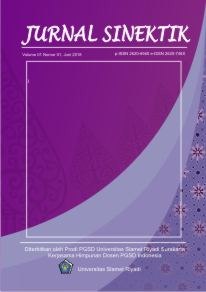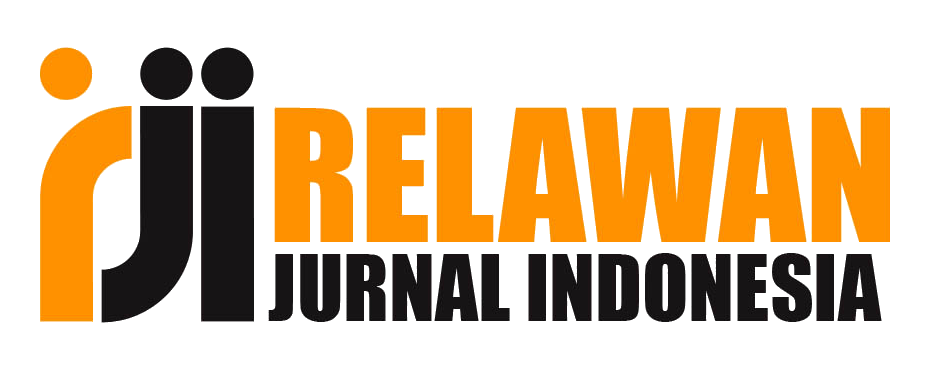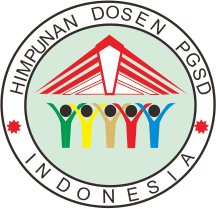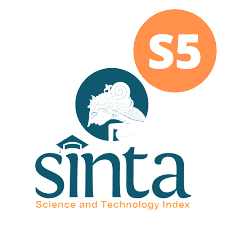PENGARUH PERMAINAN DALAM PEMBELAJARAN IPAS TERHADAP MOTIVASI BELAJAR SISWA KELAS 4 SD N CIBUNGUR
DOI:
https://doi.org/10.33061/js.v7i1.8207Keywords:
influence, game, motivationAbstract
This research is an observational study of data on students who are less effective in learning which can indicate a lack of motivation and concentration in student learning in participating in various learning activities both inside and outside the classroom. The objectives of this study include (1) testing the relationship between games and science learning outcomes (2) testing the relationship between students' learning motivation and science learning outcomes (3) the relationship between games and learning motivation and also science learning outcomes. The method used is the class action method or Classroom Action Research, which is research conducted in the classroom by planning an action which is then implemented in the form of a class action. Based on the results of the study showed that the presence of the game will provide an increase in students' learning motivation, can eliminate boredom in students, and can increase their enthusiasm for learning. So with a high enthusiasm for learning, students can also be more prepared in receiving various learning materials that will be delivered.
References
Algivari, A., & Mustika, D. (2022). Teknik Ice Breaking pada Pembelajaran Tematik di
Sekolah Dasar. Journal of Education Action Research, 6(4), 433–439.
Arianti, A. (2019). Peranan Guru Dalam Meningkatkan Motivasi Belajar Siswa.
DIDAKTIKA : Jurnal Kependidikan, 12(2), 117–134. https://doi.org/10.30863/didaktika.v12i2.181
Ayu, C. (2017). The effect of school environment, the role of teachers in learning
proces to student learning motivation. Journal University of Pahlawan Tuanku
Tambusai, 2(2), 57–71.
Bakri, A. M. (2015). HUBUNGAN ANTARA MINAT BELAJAR DAN HASIL BELAJAR
IPA. 7, 149–161.
Coman, C. (2020). Online teaching and learning in higher education during the
coronavirus pandemic: Students’ perspective. Sustainability (Switzerland), 12(24),1–22. https://doi.org/10.3390/su122410367
Emda, A. (2018). Kedudukan Motivasi Belajar Siswa Dalam Pembelajaran. Lantanida
Journal, 5(2), 172. https://doi.org/10.22373/lj.v5i2.2838
Larlen. (2013). Persiapan Guru Bagi Proses Belajar Mengajar. Pena , 3(1), 81–91.
Le, H. V. (2021). An Investigation into Factors Affecting Concentration of University
Students. Journal of English Language Teaching and Applied Linguistic, 3(6), 7–12. https://doi.org/10.32996/jeltal
Leonard, Wibawa, B., & Suriani. (2019). Model Dan Metode Pembelajaran Di Kelas.
Marpanaji, E., Mahali, M. I., & Putra, R. A. S. (2018). Survey on How to Select and
Develop Learning Media Conducted by Teacher Professional Education
Participants. Journal of Physics: Conference Series, 1140 (1). https://doi.org/10.1088/1742-6596/1140/1/012014
Mauliya, I., Relianisa, R. Z., & Rokhyati, U. (2020). Lack of Motivation Factors Creating
Poor Academic Performance in the Context of Graduate English Department
Students. Linguists : Journal Of Linguistics and Language Teaching, 6(2), 73. https://doi.org/10.29300/ling.v6i2.3604
Mutmainah. (2022). Pelatihan Penerapan Ice Breaking Dalam Meningkatkan Hasil
Belajar Bagi Siswa di MI Zidayattun Hikmah Manado. 4(2), 32–36.
Puspitarini, Y. D., & Hanif, M. (2019). Using Learning Media to Increase Learning
Motivation in Elementary School. Anatolian Journal of Education, 4(2), 53–60.
https://doi.org/10.29333/aje.2019.426a
Rahman, S. (2021). Pentingnya Motivasi Belajar Dalam Meningkatkan Hasil Belajar.
PROSIDING SEMINAR NASIONAL PENDIDIKAN DASAR “Merdeka Belajar
Dalam Menyambut Era Masyarakat 5.0,†November, 289–302.
Safira, C. A., Setyawan, A., & Citrawati, T. (2020). Identifikasi Permasalahan
Pembelajaran IPA Pada Siswa Kelas III SDN Buluh 3 Socah. Jurnal Pendidikan
Mipa, 10(1), 23–29. https://doi.org/10.37630/jpm.v10i1.277
Usman, O., & Yulianingtias, R. (2022). The Effect of Reading Interest, Learning
Discipline, and Learning Motivation on Student Learning Outcomes. International
Journal of Education and Teaching, 2(1), 13–28. https://doi.org/10.51483/ijedt.2.1.2022.13-28
Downloads
Published
How to Cite
Issue
Section
License
Copyright (c) 2023 Jurnal Sinektik

This work is licensed under a Creative Commons Attribution-NonCommercial 4.0 International License.
Authors who publish this journal agree to the following terms:
- Authors retain copyright and grant the journal right of first publication with the work simultaneously licensed under a Creative Commons Attribution License that allows others to share the work with an acknowledgement of the work's authorship and initial publication in this journal.
- Authors can separately make additional contractual arrangements for non-exclusive distribution published by the journal (e.g., publish it in a book), with an acknowledgement of its initial publication in this journal.
- Authors are allowed and encouraged to send their work via online (e.g., in the institutional repositories or their website) after published by the journal.














